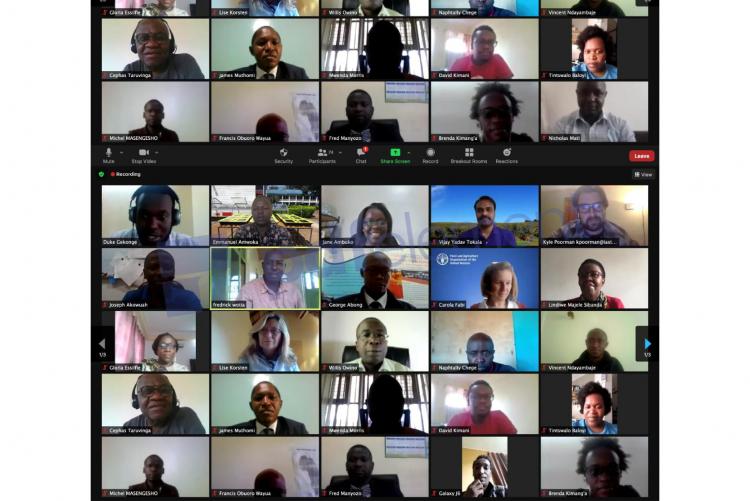On 3rd to 5th May 2021 the University of Nairobi Postharvest Research team drawn from the Departments of Plant Science & Crop Protection and Food Science Nutrition and Technology hosted a 3-day intensive short course titled Postharvest Food Loss and Waste Reduction: Towards Sustainable Food Systems. The short course is one of the Capacity Building activities under the Capacity Building in Food security for Africa (CaBFoodS-Africa) project. The CaBFoodS-Africa Project is a collaborative initiative between University of Pretoria (Lead), University of Nairobi, University of Ghana and other private sector actors in the food sector under the ARUA Center of Excellence in Sustainable Food Systems which is hosted by University of Pretoria.The purpose of the training was to increase knowledge and awareness on postharvest food loss & waste hence contribute to capacity building of the critical mass required to tackle the problem. The course was organized/coordinated by Prof Jane Ambuko, Department of Plant Science and Technology who is also the University of Nairobi PI, CabsFoods-Africa Project. Prof. Ambuko was supported in the course organization by Dr. George Abong (Department of Food Science, Nutrition and Technology, DFSNT; graduate students (Duke Gekonge, PhD Food Science and Emmanuel Amwoka, MSc Horticulture); a Senior Technologist from DFSNT (Mr. Paul Ongaro) and Mr. Kyle Poorman, a communication expert from the Consortium for Innovations in Postharvest Loss and Food Waste Reduction which is hosted by Iowa State University, USA.
The opening session of the training was graced by the Principal, College of Agriculture & Veterinary Sciences, Prof. Rose Nyikal; the Dean Faculty of Agriculture, Prof. Moses Nyangito and Chairmen of the Departments involved in the training namely Prof. James Muthomi (Department of Plant Science & Crop Protection) and Dr. George Abong’ (Department of Food Science Nutrition and Technology). The Director of the ARUA Center of Excellence in Sustainable Food Systems (ARUA-SFS) Prof. Lindiwe Sibanda also graced the opening session. Prof Sibanda used the opportunity to sensitize the participants about the ARUA-SFS – the strategic vision, priorities, theory of change, programs among other key messages.
It is noteworthy that although the training initially targeted only 3 facilitators and 20 trainees from Africa, it attracted 13 facilitators and > 70 trainees. This was made possible by the virtual offering which was necessitated by restricted movement. The 13 facilitators are global subject matter experts in postharvest management from various institutions around the world – see course announcement. The > 70 targeted/nominated food supply chain practitionerswere drawn from public and private institutions/organizations. They included Researchers/Academia, County Agricultural Officers, Extension Officers, Traders, Private Sector actors, Processors, Farmers, Development Partners, Non-governmental Organizations, Community Based Organizations among others representing 9 African Countries and 3 countries outside of Africa.
The 3-day training was organized in three sessions as follows:(see the training program)
- A virtual theory session covering 13 modules which were delivered by subject matter experts in postharvest management (see course program).
- A virtual practical session where the participants watched pre-recorded practical sessions in wet and dry processing of fruit & vegetables processing (at the Food Processing Hub); processing of diary products including fresh milk, fermented milk, plain yoghurt, mango fruit enriched yoghurt and cheese; processing of meat products (mainly sausages). The session was complemented with presentations that provided an overview of the recorded practical and a lively question and answer session from the participants after they watched the video. Watch the prerecorded practical session at https://youtu.be/v0AamwxgKQM
- Log in to post comments

